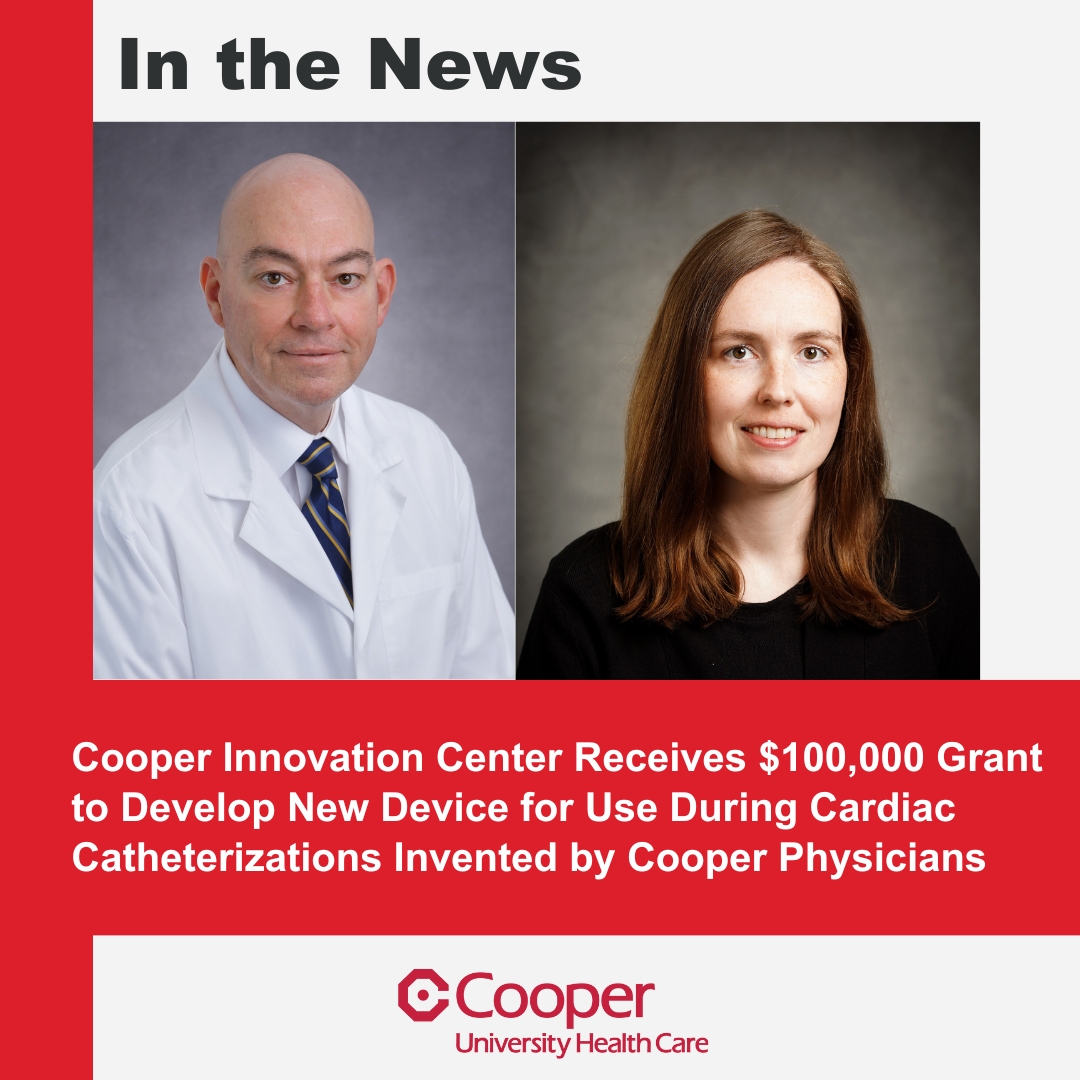 Cooper University Health Care’s Center for Innovation has received a $100,000 grant from the Foundation for Health Advancement (FHA) to develop a new medical device that will aid physicians performing cardiac catheterizations and related procedures for greater efficiency, ultimately leading to better patient care.
Cooper University Health Care’s Center for Innovation has received a $100,000 grant from the Foundation for Health Advancement (FHA) to develop a new medical device that will aid physicians performing cardiac catheterizations and related procedures for greater efficiency, ultimately leading to better patient care.
The Antegrade Femoral Artery Entry Device and Sheath was invented and developed by vascular and endovascular surgeons Jeffrey P. Carpenter, MD, chairman and chief of the Department of Surgery at Cooper, and Katherine K. McMackin, MD, MS, director of vascular surgical research at Cooper. The device will help physicians overcome challenges accessing the femoral artery, the main blood vessel supplying blood to the lower body, which is used as the path to the heart during these types of procedures.
During catheterizations, the medical team typically guides wires, catheters, balloons, and stents to the heart through the femoral artery beginning in the upper thigh and moving up into the patient’s heart.
“Body structure can vary greatly from patient to patient, and the abdominal wall can often create difficulties when the medical team is trying to guide numerous medical instruments through the femoral artery space,” Dr. Carpenter explained. “Depending on the patient’s abdominal structure, the team may not be able to complete these steps, resulting in the patient bleeding or the inability to complete the procedure altogether.”
Drs. Carpenter and McMackin designed a sheath and delivery system that enables the insertion of multiple wires and instruments in opposing directions through a single port of entry to overcome any challenges with the patient’s abdominal structure, thus giving clinicians more options and greater flexibility to complete the procedure successfully. In addition to improving ergonomics and function, the device’s design may also help reduce the risk of infection during the procedure.
“Currently, more than a million cardiac catheterizations and angiographic procedures are done every year in the United States,” Dr. McMackin said. “We anticipate that this new device will potentially have widespread use and positively impact patient outcomes.”
“Physicians have long expressed the need for improved devices and methods to aid in these types of procedures,” Dr. Carpenter said. “We are hopeful that this device will provide those new options.”
The grant funding will be used for the development and testing of several prototype devices.
“Drs. Carpenter and McMackin have shown relentless commitment and passion toward creating a device to improve patient outcomes during endovascular interventions,” said George F. Heinrich, MD, vice chair and CEO of New Jersey Health Foundation. “We are excited to support the development of the prototype through the Innovation Grant and the team is hopeful to bring a new bidirectional sheath to the operating table.”
“We are grateful to the Foundation for Health Advancement for their support. Over the past year, the FHA has provided critical funding for a number of inventions and projects, allowing Cooper’s researchers and clinicians to develop and bring to market promising new technologies that will improve medical science and ultimately patient care,” said Neal Lemon, PhD, MBA, director of the Cooper Innovation Center, which was founded in 2022 to advance biomedical research and technologies developed by Cooper physicians and researchers.
About Cooper University Health Care
Cooper University Health Care, with its MD Anderson Cancer Center at Cooper and affiliation with Cooper Medical School of Rowan University, is a leading academic health system. Cooper has nearly 10,000 team members including 1,600 nurses, and more than 900 employed physicians and 450 advanced practice providers. Cooper University Hospital has been recognized as a top-performing regional hospital by U.S. News & World Report’s 2023-2024 Best Hospitals annual survey and has an “A” Hospital Safety Grade from The Leapfrog Group, a national nonprofit upholding the standard of patient safety in hospitals and ambulatory surgery centers.
Cooper has revenues of more than $2 billion and has an “A-” rating from S&P Global Ratings and “A3” rating from Moody’s Investors Service. Cooper University Hospital is the only Level 1 Trauma Center in South Jersey and the busiest in the region. Nearly two million patients are served annually at Cooper’s 663-bed flagship hospital, outpatient surgery center, three urgent care centers, and more than 100 ambulatory offices throughout the community. Cooper has been named as one of America’s Best Employers by Forbes for three consecutive years.
The Cooper Health Sciences campus in Camden, New Jersey, is home to Cooper University Hospital, MD Anderson Cancer Center at Cooper, Children’s Regional Hospital at Cooper, and Cooper Medical School of Rowan University. Visit CooperHealth.org to learn more.
About the Foundation for Health Advancement
The Foundation for Health Advancement (FHA) is a Princeton, New Jersey based not-for-profit corporation that supports health-related research and education programs in New Jersey by providing grants to support early-stage university technologies with strong commercialization potential through its Innovation Grant Program. FHA’s affiliate, the New Jersey Health Foundation, provides grant funding for basic research and community health projects through its Research/Community Health and Social Service grant programs. A third funding program, offered through Foundation Venture Capital Group, another FHA affiliate, uses impact investing to provide pre-seed and seed funding to health-related startup companies at their partner organizations to help them advance to and through commercialization.
###
